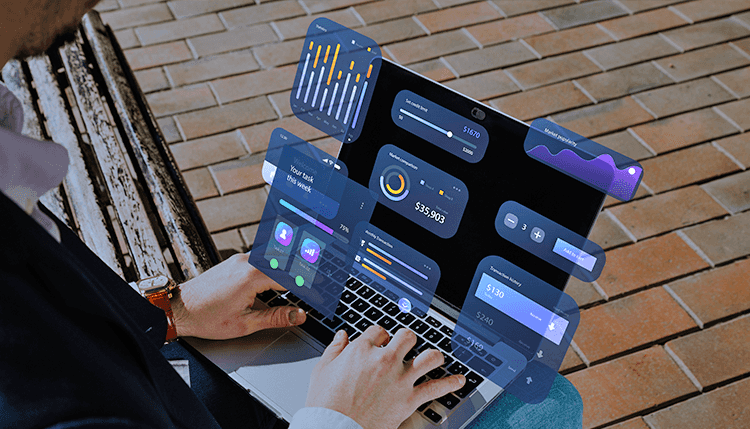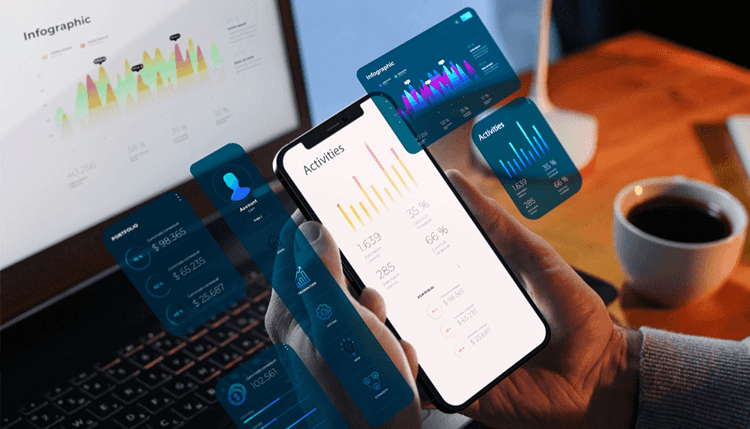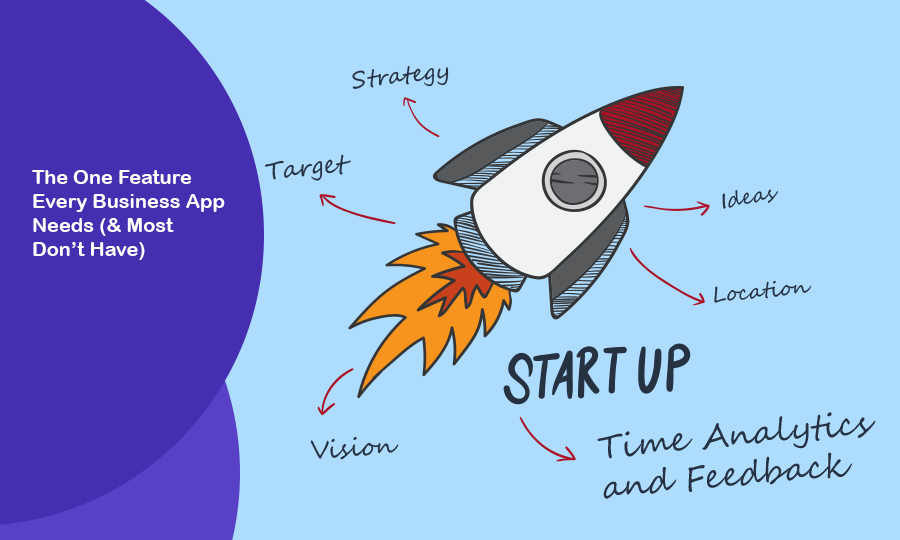Business apps have become indispensable tools for companies aiming to streamline operations, connect with customers, and drive growth. From small startups to established enterprises, mobile app development for business has transformed how companies operate, offering everything from e-commerce platforms to customer service portals. Yet, despite their potential, many business apps — especially those built for small businesses and startups — lack a critical feature that could unlock their true power: real-time analytics and feedback integration. This article dives into why this feature is a game-changer, why it’s so often missing, and how businesses can ensure their apps include it to stay ahead in a competitive landscape.
Why Business Apps Matter More Than Ever?
Business apps are no longer a luxury — they’re a necessity. For small businesses, mobile app development for small business offers a way to level the playing field, reaching customers directly on their smartphones. Whether it’s an app for managing orders, scheduling services, or selling products, these tools enhance efficiency and engagement. Meanwhile, startups rely on startup business mobile app development to disrupt markets and build loyal user bases from scratch.
But here’s the catch: not all business apps are created equal. While many focus on sleek designs and core functionalities, they often overlook a feature that could turn them from useful tools into strategic assets — real-time analytics and feedback. Without it, businesses are missing out on insights that could drive data-driven decisions, boost user satisfaction, and fuel growth.
The Missing Piece: Real-Time Analytics and Feedback
So, what exactly is real-time analytics and feedback integration? Simply put, it’s the ability of a business development app to track user interactions as they happen — think clicks, time spent on features, or drop-off points — while also collecting direct feedback through surveys or ratings. Imagine a retail app that instantly shows which products users browse most or a service app that gathers reviews the moment a transaction is complete. This isn’t just data; it’s actionable insight delivered on the fly.
Yet, despite its potential, this feature is absent from many apps, particularly those built on tight budgets. Research shows that business app development cost and technical complexity are the culprits. Small businesses, eager to launch their mobile app development for small business, often prioritize basic features over advanced analytics to keep expenses low. The result? Apps that work but don’t evolve — leaving businesses in the dark about how users interact with them.

Why This Feature Is a Must-Have?
The value of real-time analytics and feedback can’t be overstated. Here’s why it’s the one feature every business app needs:
1. Data-Driven Decisions
In an era where every click counts, analytics empower businesses to make informed choices. For example, a custom business app development project for a retail startup could reveal that users abandon their carts at the payment screen. Armed with this data, the business could tweak the checkout process, potentially increasing conversions. Without analytics, they’d be guessing — or worse, losing customers without knowing why.
2. Improved User Engagement
Feedback integration lets users voice their opinions directly within the app. A service-based business development app could prompt a quick rating after an appointment, giving the business instant insights into customer satisfaction. This not only helps refine the app but also shows users their input matters, fostering loyalty — crucial for small business mobile app development where retention is key.
3. Growth and Scalability
For startups and small businesses, growth is the ultimate goal. Real-time analytics provide a roadmap. By tracking usage trends, businesses can spot opportunities — like a feature users love but rarely find — or identify pain points to fix. This is especially vital in mobile app development for digital business, where agility can make or break success.
Take Shopify as an example. Its mobile app offers real-time analytics, letting e-commerce businesses monitor sales, track inventory, and analyze customer behavior — all from their phones. This has made it a go-to for small retailers, proving that analytics aren’t just for big players. Contrast that with a basic app lacking these insights, and the difference is stark: one drives growth, while the other stagnates.
Why So Many Apps Miss the Mark?
If real-time analytics and feedback are so critical, why are they missing from so many business apps? The answer lies in three main hurdles:
1. Cost Concerns
Building an app isn’t cheap, and integrating analytics adds to the business app development cost. For small businesses, every dollar counts. Adding real-time tracking or feedback tools — like Firebase or Amplitude — means extra development time and often subscription fees. Many opt for simpler solutions, assuming they can add analytics later (spoiler: retrofitting is often costlier).
2. Lack of Awareness
Not every business owner understands the power of analytics. Some rely on external tools like Google Dashboards or manual surveys, missing the seamless insights an integrated system provides. This is common in android business app development and iOS app development business, where the focus is on launching a functional app rather than a data-driven one.
3. Expertise Gaps
Implementing analytics isn’t plug-and-play — it requires skill. Not all business app development companies have the know-how to integrate these features effectively. Small businesses searching for a “business app development company near me” might settle for a budget provider, only to end up with an app that lacks depth.

Real-World Wins: Analytics in Action
To see the impact of this feature, let’s look at some success stories. HubSpot, a CRM giant, embeds real-time analytics in its mobile app, letting businesses track leads and campaign performance instantly. Small businesses love it for its actionable insights, making it a standout in mobile app development for business. Similarly, Shopify’s app delivers sales trends and customer data in real-time, helping retailers adapt on the go.
Now imagine a small coffee shop with a custom ordering app. With analytics, they could see that 70% of users order lattes between 7-9 AM, prompting a morning discount to boost sales. Without it, they’d miss that opportunity entirely. These examples show how analytics turn apps into tools for growth, not just convenience — whether built for Android, iOS, or cross-platform use.
How to Get It Right: Building Analytics Into Your App
Ready to make your app a data powerhouse? Here’s how to ensure real-time analytics and feedback are part of your custom business app development:
Step 1: Partner with Experts
The right business app development company makes all the difference. Look for mobile app development experts with a track record in analytics integration. Whether you need android business app development, iOS app development business, or cross-platform app development experts, choose a team that understands your goals. Some companies emphasize full-cycle services, including analytics, solving real business challenges.
Step 2: Balance Cost and Value
Yes, analytics add to the upfront business app development cost, but they’re an investment, not an expense. For budget-conscious businesses, tools like Google Analytics for Firebase offer free tiers with robust features — perfect for small business app development.
Step 3: Tailor to Your Platform
Different platforms have unique strengths. Android business app development can leverage Firebase’s deep Android integration, while iOS app development business can pair App Store Connect with third-party tools for richer insights. Cross-platform solutions blend the best of both, ensuring consistency across devices.
Step 4: Start Small, Scale Up
Don’t overwhelm your app with every metric out of the gate. Begin with key KPIs — like user retention or feature usage — and expand as you grow. This keeps costs manageable and lets your app evolve with your business.
Don’t Build an App Without It
In a world where data is king, real-time analytics and feedback integration isn’t just a nice-to-have — it’s the feature that separates good apps from great ones. For small businesses and startups relying on mobile app development for small business, it’s the key to unlocking insights, engaging users, and driving growth. Yet, too many apps skip it, held back by costs, complexity, or a lack of vision.
By partnering with the right business app development companies, leveraging affordable tools, and prioritizing this feature from day one, businesses can build apps that don’t just function — they thrive. Whether you’re launching a business development app on Android, iOS, or both, analytics and feedback are your ticket to success in today’s digital landscape. Don’t settle for less — your app deserves to be a game-changer.
Relevant Articles:













































